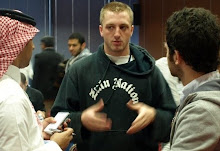Given the great privilege I've had in connecting with amazing, inspiring people in the UK and all over the world. Their struggles, ingenuity and creativity continue to challenge, inspire and motivate me personally. I wish to use this blog as a platform to share some of their stories and hopefully foster some new learning and connections.
First up Jaevion Nelson. I first connected with Jae when researching for the DfiD Youth Guidance Project (www.ygproject.org) and had the chance to meet him when he moved to the UK to study. Now back at home in Jamaica, Jae is working hard both nationally and internationally.
 Who are you and where are you from?
Who are you and where are you from? I am Jaevion Nelson and I am from Jamaica.
What work do you do and why? I do work around human rights and social justice for young people and vulnerable and marginalised groups of people. I do this because I am passionate about human social development and see my contribution as crucial to the advancement of the rights of persons in countries like my own.
What first motivated you to get involved in activism? I can't recall, but I know when I was exposed to the policy and legal aspect of how countries are governed to the extent that I understood that it has significant implications on poor and voiceless people. I knew then, that this is important and should be the focus of my activism which I have now adopted as my career.
How has your upbringing in Jamaica shaped your approach to later life? I grew up in rural Jamaica, in an extended family. During those days, I learned a lot about service from my maternal grandmother. I recall being asked to take food to an old man who lived by the train-line in a very dilapidated house. He was unknown to most of the community and had no family there. So it was from those days, that I developed the inclination to look out for those who need empowerment and help most desperately.
"The mere fact that we still have a representative of the Queen in Jamaica after 50 years of independence from Britain is evidence of our dependence on her." Due to its colonial history Jamaica has strong links to the UK and US, what are the advantages and disadvantages of this in the present?The views on such a question are quite mixed. Perhaps, I am one of few persons with very little perspective on this. Both relationships have proved worthwhile over the years. However, our colonial history has left a bitter sense of Jamaican pride in many people. There has been several geo-political advantages for both countries and there have been disadvantages too. The mere fact that we still have a representative of the Queen in Jamaica after 50 years of indenpendence from Britain is evidence of our dependence on her.
"Information Is Power"You specialise in communications, how do you see the relationship between communications and development? I wouldn't say I specialise in communications, but I do have an appreciation for its importance in keeping people informed and aware of progress in development. Information is power-- it exposes human beings to a whole world outside of what they interact with on a daily basis.
 You work on HIV/AIDs locally and internationally. Tell me more about your role and what you are advocating for
You work on HIV/AIDs locally and internationally. Tell me more about your role and what you are advocating forMy work with HIV and AIDS has been with the Jamaica Youth Advocacy Network (JYAN) -- much of which has been fostered through an effective partnership with Advocates for Youth, based on Washington DC. They have pretty much since 2008 become like a parent for JYAN, where sexual and reproductive health and rights of young people are concerned. We have also partnered with a number of other organisations, namely, Caribbean Vulnerable Communities Coalition, and a wide range of actors.
Some of the things we push internationally -- primarily increasing youth involvement in the global AIDS response (at all aspect). We call for funding, prioritization of key and affected populations of youth, better programmes, among others.
Another important part of my work, is advocacy around the human rights at most at risk populations, such as men who have sex with men. They bear the highest burden of HIV in Jamaica and so I think more people should begin to articulate the importance of providing services for these men. It is very dangerous and and I try not to publicize the more sensitive parts of my work like being sympathetic to MSM and sex workers and people living with HIV, but I measure the risk and carry on.
What has been your proudest achievement to date?I don't have any one achievement because I have had several goals over the years, many of which I have been able to achieve. Some include an being a Chevening Scholarship recipient, Prime Minister Youth Awardee and something as simple as addressing delegates at a UN General Assembly meeting.
What is the biggest issue in Jamaican society at the moment that you would like to see addressed?The disregard and lack of understanding about human rights and its impact on development.
I think one of the important thing to do is to include human rights education in the school curriculum. This will help people to know about their rights and the rights of the peers. Such an approach can help to reduce vigilante justice as people will understand, for example, the protections they have under the law from police abuse or what avenues there are for redress.
Well a massive thank you Jae. keep up the hard work!
Find out more at
http://www.advocatesforyouth.org
http://www.amplifyyourvoice.org/jamaica


